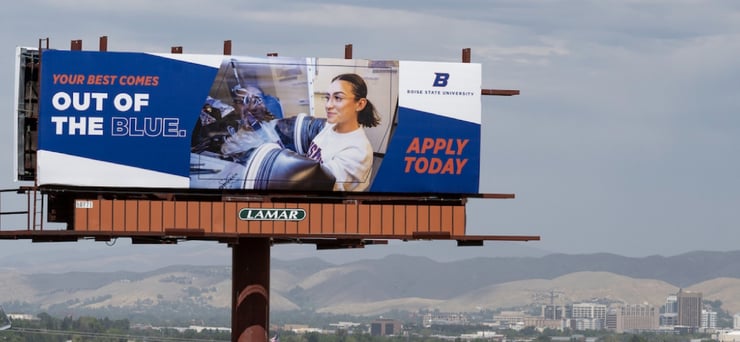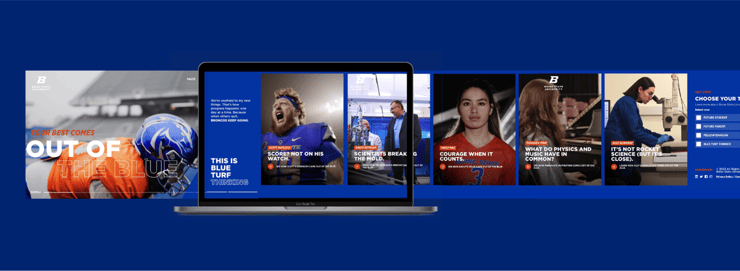We held the party in B100, a small room at the end of a hallway that led directly into the admissions office. This room was usually a place to meet faculty members during admitted student days, or the place where prospective students congregated before or after their campus tours. On that day, however, it was the room that housed my going away party.
Two years earlier, at the opposite end of the hallway, the Dean of Students offered me a promotion to help the school increase its marketing efforts. I was a young employee with a shiny new master’s degree, hungry to advance my career. More importantly, I seemed to have a natural affinity for the social and content marketing tactics that were foreign to many of my peers. But there was a catch. We lost an admissions counselor, and they wanted to split the role. Half of my responsibilities would be considered marketing and half admissions; it was the only way they could make the position work. I agreed to the split responsibilities, and after several months (that felt like several years), I had a new title, a new office, and a new boss.
That experience occurred in 2014, but I’ve been thinking about that phase of my career journey and how it mirrors what we reported in our recent Higher Ed Marcom Professional Development and Salary Study.
In our study, 29% of marketers at the manager level—and exclusively those who, like me, did not have experience outside of higher ed—reported additional responsibilities within admissions. They were the only group in our report with that type of dual role.
The cause of that duality, I suspect, is not dissimilar from what caused me to take on my Assistant Director of Communications and Admissions role in 2014: a decentralized marketing structure; a School within a University that did not have a history of investing in marketing; and a School that measured success in the quantity and quality of each year’s entering class.
Despite the duality of my role, I blossomed in the following two years. I built new content marketing channels, leveled up social media and social listening strategy, enhanced email marketing comm flows, and revamped printed admissions material. I also led the process of formalizing their first-ever brand platform, working with a representative from central marketing and communications to ensure alignment with the institutional brand. And I did it all while reading applications, traveling to law school fairs, hosting small groups of admitted students, and giving campus tours. It was exhausting. Worse yet, conversations about building a dedicated marketing team did not appear to advance.
So, in the spring of 2016, I made the same decision many marketers have made in the last 12 months. I needed to move on to advance my career. In my effort to educate myself about higher ed marketing, I stumbled across a local higher ed agency. When an opportunity presented itself a few months later, I made the jump. And that is how I found myself in room B100, saying goodbye to friends and colleagues. Many wanted to know where I was going. I gleefully told them how I’d be working with multiple campuses and supporting the agency’s own marketing efforts as a Senior Marketing Manager. Many were quick to say “congratulations” or “we’ll miss you.” But I also heard something else that caught me off guard:
“I’m so sad you’re leaving higher ed.”
In the moment, I couldn’t wrap my head around that comment. Sure, my email address wouldn’t end in .edu anymore, but I didn’t feel like I was leaving higher ed entirely. After all, I would still be working with colleges and universities, and my dedication to supporting the industry hadn’t waned. If anything, I wanted to contribute more by working with multiple campuses. Still, those comments planted doubts. I began to wonder if I was, in fact, less a part of higher education than I had once been.
Over the years, I became more confident in telling people that I hadn’t left the industry. But it was Thom Golden, Founder and CEO of Golden Educational Consulting, who finally put into words what I had been feeling. In a 2021 episode of the Admissions Leadership Podcast (ALP), Golden shared how he, too, faced the perspective that he was leaving higher education when he left his campus-based role for a role at a higher ed tech startup. His response: he wasn’t leaving higher ed. He was doubling down on it.
“To me, going to that side [EdTech] was where the innovation was. That’s actually deeper into higher education. That’s where higher education can find its path forward—new methods, new materials, created in a space that is driven by results. To me, that was putting me deeper into the way I wanted to help higher education.”
Golden’s response—his assertiveness and confidence in his position—is more relevant than ever. Our report found that more than two-thirds of higher ed marketers were exploring leaving their campus; more than half were considering leaving the industry.
But what does it mean to leave our industry? And more importantly, what doesn’t count?
At SimpsonScarborough, we’ve hired nearly ten people directly or one step removed from a campus-based role just this year. Other agencies like ours are experiencing a similar interest in open roles from those currently working on campus. Have those individuals left higher education? I have a hard time believing that’s the case.
But it’s not enough for those on the private side of higher education to believe they’re still an integral part of the industry. Those still on campus need to see it too. Campus-based marketers need to see their off-campus colleagues as trusted partners who are just as dedicated to the cause but have chosen a different pathway to advance higher education.
To do so, they’ll need to look inward and consider why that pathway feels like the better option for some within the industry. The open-ended responses within our report make it clear that these departures aren’t a referendum on higher education. They result from individuals seeking higher pay, clearer paths of advancement, a new challenge or growth opportunity, and, in some cases, a desire to feel more valued. Not surprisingly, their motivation to positively impact higher education has not evaporated. If anything, they’re making a more profound commitment.
As marketing professionals, we need to examine the factors that have created an environment where those desires don’t feel attainable on campus. And I do mean the totality of those desires. This exodus is about so much more than money. While some campuses have already begun to address staff salaries, I hope that is the beginning of the process and not the only solution considered.
Some have posited that this higher ed exodus will boomerang in the future. Former campus staffers will return to campus-based employment equipped with new skills to serve them and their institution well. It’s a wonderful, optimistic perspective on the potential long-term ramifications of higher ed’s version of the Great Resignation. I would like to see it come to fruition. But it won’t happen if we choose to dismiss these individuals as having left higher ed in the interim. Rather, we should choose to celebrate their advances externally and learn from them internally. After all, what are we if not a community of professionals drawn to the pursuit of education?
__











